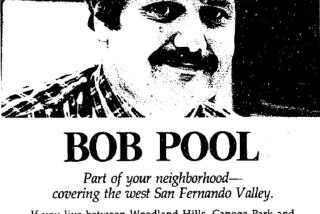Ray Bradbury, science fiction writer, was grounded in Los Angeles
In his fervid imagination, Ray Bradbury roamed across time and space. But as a longtime Angeleno, he was deeply rooted in the otherworldly landscapes and swiftly evolving human topography of his adopted home of Southern California.
Not only did Los Angeles, where Bradbury lived for decades, help shape his fantasy andsci-fiwritings. The author also was known across the city as a beloved and familiar figure: supportive of the local literary and theater communities, a regular at bookstore readings and speaking engagements, a haunter of libraries and bookshops, and an enthusiastic promoter of the culture of reading.
Southern California, in turn, honored Bradbury not only with robust book sales and countless accolades, but by enlisting him for numerous cultural endeavors. In 2002, Bradbury’s seminal 1953 novel, “Fahrenheit 451,” about a futuristic society in which books are outlawed, was chosen for the Los Angeles version of the “One Book, One City” community reading program.
Architects even hired him to be a creative consultant-designer on shopping malls such as the Glendale Galleria and the Westside Pavilion in Los Angeles. It was an assignment for which Bradbury, who envisioned dystopian post-World War II U.S. suburbs and semi-utopian outer-space colonies, was singularly suited.
Bradbury was years ahead of Los Angeles in another respect: He didn’t drive a car, and he frequently navigated the city by bike.
Although Bradbury’s fiction referred only rarely and for the most part indirectly to Southern California, its influence on his thinking was palpable. Kim Stanley Robinson, author of the acclaimed “Red Mars,” “Blue Mars” and “Green Mars” trilogy, who grew up in Orange County, said he felt a bond with Bradbury because both writers were born in Waukegan, Ill., then moved with their parents to Southern California as children.
“I feel that we both ended up as science fiction writers partly because of this childhood history; southern California has been a science fictional place for a very long time,” Robinson wrote in an email message.
As news of the author’s death at 91 spread across the region, readers and fellow writers reacted with sadness and appreciation.
“Bradbury is a bookseller hero,” said Allison Hill, president and chief operating officer of Vroman’s bookstore and Book Soup. “Fahrenheit 451,” for example, still sells very well, Hill said; in the first five months of this year, Vroman’s sold close to 600 copies.
On Wednesday, some Vroman’s customers asked store personnel about services for the author — a mark of the connection that even readers who didn’t know Bradbury personally felt with him.
Bradbury also was an active and familiar presence in Southern California theater circles, adapting some of his popular fiction for the local stage while also penning original theatrical creations.
Bradbury had a five-year relationship with the Fremont Centre Theatre in South Pasadena. The company presented a number of Bradbury productions, including a long-running stage adaptation of “Fahrenheit 451”; “The Wonderful Ice Cream Suit,” which was adapted from Bradbury’s short story; and “Yestermorrows,” also adapted from some of the writer’s short stories.
Lissa Reynolds, the co-artistic director of the Fremont, said the company served as Bradbury’s theatrical home. She said the writer liked the small-town atmosphere of South Pasadena and would sign autographs and socialize with audiences after performances of his plays.
“He would always come on opening night,” she recalled. He was “one of the loveliest people.”
Bradbury headed the Pandemonium Theatre Company in Los Angeles for many years, and he and his company frequently produced plays at the Court Theatre in West Hollywood.
Among Bradbury’s other stage credits was “Madrigals for the Space Age,” a work for chorus and narrator, featuring music by Lalo Schifrin. The show was presented at the Dorothy Chandler Pavilion in 1973.
Among those L.A. residents paying Twitter tribute to Bradbury on Wednesday was Hugh Hefner, founder and editor of Playboy magazine, where “Fahrenheit 451” first appeared.
“He will be missed,” Hefner wrote.
FULL COVERAGE: Ray Bradbury’s life and career
Staff writers Carolyn Kellogg and David Ng contributed to this story.
More to Read
The biggest entertainment stories
Get our big stories about Hollywood, film, television, music, arts, culture and more right in your inbox as soon as they publish.
You may occasionally receive promotional content from the Los Angeles Times.











